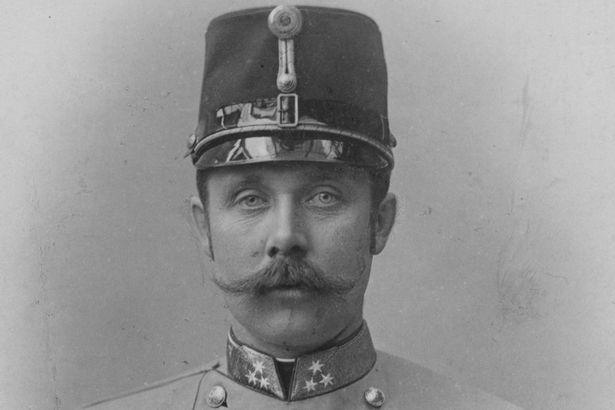The shocking assassination of Russian Ambassador Andrei Karlov today in Ankara, amidst a rising tide of global violence and instability, has pitched people’s thoughts to events in Sarajevo, 102 years ago, when the assassination of Archduke Franz Ferdinand, heir to the crown of Austria-Hungary, provided the trigger for World War I. Let me say, briefly, that I don’t think this is that kind of event. But one key to understanding why today’s assassination is not like that other assassination 102 years ago is realizing that our collective understanding of what happened during the so-called “July Crisis” of 1914 is basically wrong.
The received understanding of the outbreak of World War I goes something like this. A Serbian nationalist gunman, Gavrilo Princip, assassinated Franz Ferdinand. Austria-Hungary demanded justice from Serbia and in relatively short order the overlapping series of alliances that strung together the various powers of Europe sucked each into a ruinous war that none of the powers actually wanted but were unable to avoid. Germany backed Austria. Russia backed Serbia. France and Great Britain backed Russia. Toss in a bunch of secondary powers bound to one of the major powers and within a matter of weeks the entire continent was at war. This portrayal is most memorably and masterfully captured in Barbara Tuchman’s The Guns of August: The Outbreak of World War I.
This is probably the version of events you know. But it is almost certainly wrong. Since the 1960s, it has been widely understood among historians that far from being a collective failure of diplomacy or the result of entangling alliances, World War I was engineered deliberately by Germany.
This may seem like a bold statement. But it is amply backed up by the available evidence of which there is a great deal.
Of course, one may step back and say that the great power rivalry between Germany and the United Kingdom, the arms race of the first years of the 20th century, nationalism, imperialism, the decline of the multinational empires of Eastern Europe and various other isms and trends were deep causes of the war. But the actual war, which emerged from the crisis of Franz Ferdinand’s assassination, happened because Germany wanted to go to war.
Why did Germany drive Europe and the world into war which would led to the collapse of the German state? The simplest explanation is that the German government and general staff believed that a European war would eventually come, that such a war was essential to its territorial ambitions and – most importantly – that time was not on Germany’s side. The Germans believed that they were better prepared for a war in 1914 than the Entente powers of Britain, France and Russia. But over time they believed their position would weaken.
Why would Germany, the rising power of the early 20th century, believe that time was running against it? In large part because Germany’s ability to win a continental war rested on her junior partner, Austria-Hungary. The problem was that Austria-Hungary was an increasingly decrepit and declining power, slowly being eaten alive by the competing and often febrile nationalisms growing up within its multinational domain. So even though Germany was the emerging industrial giant of Europe with the continent’s greatest land army and a navy which increasingly rivaled that of Great Britain, its ability to win a European war would decline over time. Or at least that is how the decision makers in Berlin saw the matter. And based on that belief they drove Europe to war on what they thought were their own terms, their moment of maximum advantage.
There is a voluminous literature on this topic. Some of the most interesting comes from German Historian Fritz Fischer of the University of Hamburg and his students, whose interpretation of the origins of the war have been broadly confirmed over the last half century while being modified in various ways. But if you’re looking for an accessible and contemporary account, a good one is Europe’s Last Summer: Who Started the Great War in 1914? by David Fromkin. Ironically, Tuchman’s book was published in 1962, one year after Fischer’s key work was published in 1961. But the pervasive influence of Tuchman’s narrative has continued along more or less untouched.
Of course, Germany did not know the ruinous outcome of the war. They probably foresaw something more like their rapid victory over France in the Franco-Prussian War almost half a century earlier. Significantly, they did not want a war with Great Britain. But they were willing to risk it.
What does this tell about today? In itself, not terribly much. Assassinations don’t cause global cataclysms. More to the point, great powers don’t generally stumble into wars unless one or more of the powers want to go to war. In 1914 Germany wanted to go to war.
The one lesson that shines through most vividly from these events a century ago is the immense danger caused when one power believes it is running out of time to secure the advantages it believes it can secure only or most easily through war. I remember thinking of this ominous parallel as the US forced its war in Iraq, even after the notional premise for threatening war – the return of weapons inspectors – had been conceded. This pessimism, this need to provoke or escalate crises, is the root of all sorts of mischief. It is the best prism through which to understand the increasingly unstable moment we are now living through. Which countries if any want a general war? Which countries, if any, believe they can gain from one and at what cost? And how do we collectively prevent any major power from believing its interests can best be secured or only be secured by war?






